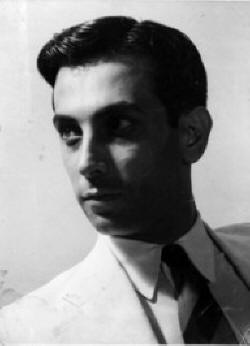

 Joaquim
Lúcio Cardoso Filho, known as Lúcio Cardoso (Curvelo,
Minas Gerais, Brazil, August 14, 1912 –
Rio de Janeiro, September 22, 1968), was a Brazilian novelist, playwright,
and poet.
Joaquim
Lúcio Cardoso Filho, known as Lúcio Cardoso (Curvelo,
Minas Gerais, Brazil, August 14, 1912 –
Rio de Janeiro, September 22, 1968), was a Brazilian novelist, playwright,
and poet.
The son of an impoverished but prominent family in Minas Gerais, Lúcio Cardoso was the brother of Adauto Lúcio Cardoso, a congressman for the center-right União Democrática Nacional and later justice of the Supreme Federal Court; and of Maria Helena Cardoso, who became a respected writer herself as a memorialist, including the editing of the posthumous memoirs of her brother Lúcio (Por onde andou meu coração, 1967; Vida-vida, 1973; and Sonata perdida: Anotações de uma velha dama digna, 1979).
At an early age, after attending school in Belo Horizonte, Cardoso moved to Rio de Janeiro, where he got a job in the Equitativa insurance company.[1] He soon came to the notice of the group of writers around the wealthy industrialist (and a poet himself) Augusto Frederico Schmidt, who published his first works. Many of these writers, including Octávio de Faria and Cornélio Penna, were, like Cardoso, Catholic - and, in the twin case of Cardoso and Octávio de Faria, both Catholic and homosexual. In a time when Brazilian literature was dominated by leftist, regionalist themes, these writers were less interested in the then-dominant political concerns of Brazilian writing than in inner experience and themes of human redemption and personal tragedy. This paramount value placed upon the subjective character of writing was a characteristic Cardoso shared also with his younger contemporary Clarice Lispector, who fell in love with Cardoso when she was a young woman, and who remained a close friend until his death.
Cardoso's first novel, Maleita (Malaria) - the story of an engineer stranded in a backwater in Minas Gerais - did not stray far from the dominant regionalist themes, which, however, he forsook after 1936, with his third novel Luz no Subsolo, in favour of psychological introspection.[2]
Cardoso was enormously prolific in several genres, including the theater, where, together with the Afro-Brazilian activist Abdias do Nascimento, he started the Teatro Experimental do Negro, Brazil's first black theater company. With Paulo César Saraceni, he was responsible for the first feature-length film of the nascent Cinema Novo, Porto das caixas - based on a true story about a crime in the municipality of Itaboraí, then a backwater rural community in the State of Rio de Janeiro. Perhaps his most famous novel is Crônica da casa assassinada (Chronicle of the Murdered House), 1959, a Faulknerian saga of a decaying patriarchal family in Minas Gerais. In this novel, one of the chief characters, Timóteo, is the family's gay scion, who lives secluded in the ancestral mansion, always dressed in his mother's old clothes, and who stands for the unravelling of the traditional order embodied in the mansion.[3]
A famous figure in the bohemian milieu of Rio de Janeiro—"Ipanema should be called Lúcio Cardoso," according to one friend[4]—his health deteriorated because of his alcoholism and dependence on prescription drugs. On December 7, 1962, at the height of his creativity, he suffered a debilitating stroke that left him partially paralyzed.[5] He struggled unsuccessfully to recover his ability to speak and write, and when that failed he turned to painting.
On September 22, 1968, following another stroke, he died in Rio de Janeiro.
My published books: